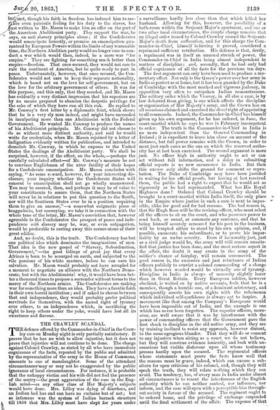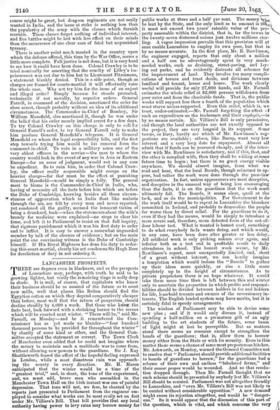THE CRAWLEY SCANDAL.
THE defence offered by the Commander-in-Chief in the Craw- ley case on Monday night is only partially satisfactory. It proves that he has no wish to allow injustice, but it does not prove that injustice will not continue to be done. The charge against Colonel Crawley, as stated by all who have immediate cognizance of the facts, repeated by the public and admitted by the representative of the army in the House of Commons, amounts to one of manslaughter. Some of the attendant eircumstfmcestmay or may not be exaggerated by the public ignorance of local circumstances. For instance, it is probable that the unhappy victim and his wife did not feel the presence of the sentry—the great aggravation of the case in the Eng- lish mind—as any other class of Her Majesty's subjects would have done. Mrs. Lilley was dying of diarrhcea, and an Indian bed has and can have no curtains but of net ; but so infamous was the system of Indian barrack structure till 1858 that Mrs. Lilley must have slept for years under a surveillance hardly less close than that which killed her husband. Allowing for this, however, the possibility of a bath-room within the Serjeant-Major's apartment, and one or two other local circumstances, the simple charge remains that an illegal order issued by Colonel Crawley caused the Serj cant- Major's death from suffocation, and for this charge the Com- mander-in-Chief, himself believing it proved, considered a reprimand sufficient retribution. His defence is that, firstly, a reprimand was in itself an unusual stretch of power, the Commander-in-Chief in India being almost independent in matters of discipline ; and, secondly, that he had only had official cognizance of all the facts for the previous ten days.
The first argument can only have been used to produce a mo- mentary effect. Not only is the Queen's power over her army in India as perfect as at home, but it has been guarded by the puke of Cambridge with the most marked and vigorous jealousy, in opposition very often to outspoken Indian remonstrances. The solitary order which the Viceroy, in all else a czar, is by law debarred from giving, is one which affects the discipline or organization of Her Majesty's army, and the Crown has on all occasions claimed and exercised the direct right of appointing to all commands. Indeed, the Commander-in-Chief has himself given up his own argument, for he has ordered, in June, the court-martial which he says he was in February incompetent to order. The truth is the Commander-in-Chief in India is no more independent than the General Commanding in Ireland ; it is expedient to leave him alone on account of the distance, but full power remains with the Crown, in order to meet just such cases as the one on which the reserved autho- rity has at last been exercised. The second argument is more just. No officer high in authority ought to act or can act without full information, and a delay in submitting official reports is no new occurrence in India. But then this excuse only shifts the ground for comment or repro- bation. The Duke of Cambridge may have been justified in waiting for his official proofs, but having at last received them, the public had a right to expect that he would act as vigorously as he had reprimanded. What has His Royal Highness done ? Ordered that Colonel Crawley should be brought to a court-martial within India itself, the only place in the Empire where justice in such a case is next to impos- sible, alike for good and for bad reasons. The bad reason is, that Sir Hugh Rose will be the revising officer, who must select all the officers to sit on the court, and who possesses power to send back, or annul, or commute any sentence, and that he being himself severely censured for his part in the business, will be tempted either to stand by his own opinion, and, if possible, exonerate his subordinate, or to prove his impar- tiality by an undue severity. Even if inexorably just, just as a civil judge would be, the army will still remain unsatis- fied that justice has been done, and the most serious aspect in the affair, the doubt it may create in the army of the soldier's chance of fairplay, will remain unremoved. The good reason is, the excessive and just reluctance of Indian officers publicly to convict a colonel commanding of a charge which however worded would be virtually one of tyranny. Discipline in India is always of necessity slightly laser than in Great Britain. Every European soldier, however obedient, is waited on by native servants, feels that he is a member, though a humble one, of a dominant aristocracy, and consequently asserts his own rights with the vehemence which individual self-confidence is always apt to inspire. A movement like that among the Company's Europeans would have been impossible out of India, and the example is one which has never been forgotten. The superior officers, more- over, are well aware that it was by interference with the power of commanding officers that the Government gave the first shock to discipline in the old native army, and they are by training inclined to resist any approach, however distant, to the same egregious blunder. That they will do or consent to any injustice when sitting as a court we do not believe, but they will construe evidence leniently, and look with un- conscious but visible disfavour upon all whose testimony presses hardly upon the accused. The regimental officers whose statements must prove the facts know well that the reasons must be grave, indeed, which can excuse a sub- altern for open criticism of his colonel, and, though they will speak the truth, they will relate nothing which they can avoid. The tendency, too, of every man in India under almost all circumstances is to resent the interference of the English authority which he can neither control, nor influence, nor inform, and the case will open with a perceptible bias through- out society in favour of the accused. The regiment ought to be ordered home, and the privilege of exchange suspended until the .final settlement of the affair. The expense of that
course might be great, but dragon regiments • are not really wanted in India, and the issue at stake is nothing less than the popularity of the army with the classes which furnish recruits. These classes forget nothing of individual interest, and five tattles might be lost with less effect on their minds than the occurrence of one clear case of fatal but unpunished tyranny.
There is another point much mooted in the country upon which the defence offered, this time by the War Office, seems a little more complete. Full justice is not done, but it is very hard to see how it could have been done. Colonel Crawley is to be tried nominally for asserting that the cruelty of Lilley's im- prisonment was not due to him but to Lieutenant Fitzsimons, a statement blankly denied. This is a side point, though as charges are framed for courts-martial it will effectually raise the whole case. Why not try him for the issue of an unjust and illegal order? Simply because he stands protected, technically if not morally, by superior orders. General Farrell, in command of the division, sanctioned the order for close arrest, though probably without an idea of its additional circumstances. The Commander in-Chief of Bombay, Sir William Mansfield, also sanctioned it, though he was under the belief that his order merely implied arrest for a few days. To try Colonel Crawley on this charge is only to call for General Farrell's order, to try General Farrell only to make him produce General Mansfield's telegram. It is General Mansfield on whom the legal responsibility falls, and the first step towards trying him would be his removal from the cemmand-in-chief. To ruin in a military sense one of the very ablest officers in the service—the man to whom the country would look in the event of any war in Asia or Eastern Europe—for an error of judgment, would not in any case be expedient. So to ruin him, in order that Colonel Craw- ley, the officer really responsible might escape on the heavier charge—for that must be the effect of punishing General Mansfield—would be simply a fully. The general most to blame is the Commander-in-Chief in India, who, having of necessity all the facts before him which are before the Duke of Cambridge, knowing besides all those dream-
* stances of aggravation which in India float like malaria through the air, are felt by every man and never reported, yet condoned all the guilty, accused the innocent victim of being a drunkard, took—when the statements about the wife's brandy for medicine were explained—no steps to clear his fame, and left it to Parliament to insist on that full inquiry, that rigdrous punishment which it was his first duty to order and to inflict. It is easy to answer a somewhat unguarded member by talk of the absence of evidence ; but on the main point the one convincing witness is the Duke of Cambridge himself. If His Royal Highness has done his duty in order- ing this court-martial, clearly his act condemns Sir Hugh Rose for dereliction of duty in not ordering it.































 Previous page
Previous page